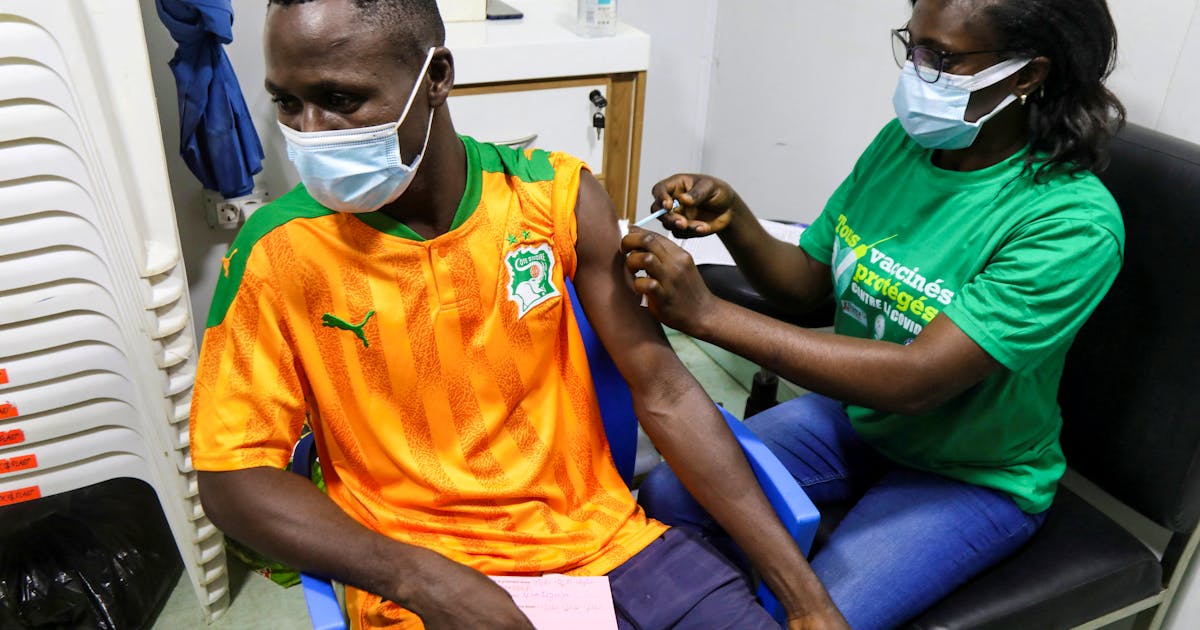
African Leaders Criticize Brussels Over Vaccines
Welcome to Foreign Policy’s Africa Brief.
The highlights this week: Tunisia’s president extends powers over judicial watchdog, al-Shabab claims responsibility for latest Somalia bomb attack, and Tanzania’s opposition leader will face terrorism charges.
If you would like to receive Africa Brief in your inbox every Wednesday, please sign up here.
Europe’s Troubled Relationship With Africa
European Union and African leaders held a two-day summit in Brussels last Thursday amid a wave of coups on the continent and anger over coronavirus vaccine supplies. Europe faces tough competition on the continent, with China, Turkey, the United Arab Emirates, and Russia all vying for influence.
To counter these competitors, Brussels has promised to roll out initiatives worth 150 billion euros (about $170 billion) in public and private investments over the next seven years as part of a 300 billion euro worldwide Global Gateway project to match China’s Belt and Road Initiative. At last year’s China-Africa summit in December, Chinese President Xi Jinping pledged to invest $40 billion over the next three years.
“We are not here to carry on business as usual,” European Council President Charles Michel said. It was a sentiment echoed by the chairman of the African Union, Senegalese President Macky Sall, who said, “It’s a fresh start for a renewed partnership.” But frustrations mounted over Europe’s refusal to discuss a temporary intellectual property waiver to allow the generic production of current vaccines—a key priority on the African side.
Although Brussels reaffirmed a plan to share at least 450 million vaccine doses by mid-2022, “We don’t want to be receiving crumbs from anybody’s table,” South African President Cyril Ramaphosa said on Friday. “Governments that are really serious about ensuring that the world has access to vaccines should ensure that we approve the TRIPS [Trade-Related Aspects of Intellectual Property Rights] waiver as we’ve put forward.”
Egypt, Kenya, Nigeria, Senegal, South Africa, and Tunisia were selected as recipients of the World Health Organization mRNA technology transfer hub to develop vaccines on the continent, in a bid to help overcome vast imbalances in global access to medicines.
South Africa will serve as a hub for that transfer, having earlier this month produced its own version of Moderna’s coronavirus vaccine, using publicly available data, and without the U.S. manufacturer’s involvement. But Afrigen Biologics in Cape Town that developed the generic version said approval could take three years due to various legal barriers, including the fact that Moderna has filed for mRNA vaccine patents in South Africa.
Two years after the pandemic began, less than 12 percent of Africa’s population is fully vaccinated, in contrast to a large majority in high-income countries who have received booster shots. Moderna has pledged to build a vaccine plant in Africa in the future, but so far Pfizer, BioNTech, and Moderna have declined a WHO request to share their mRNA technology and expertise.
“The European Union wants to be Africa’s partner of choice,” European Commission chief Ursula von der Leyen told reporters on Friday. But Ramaphosa remarked that the reluctance of Europe to reach an agreement on the TRIPS waiver weakens that relationship.
Wednesday, Feb. 23: Turkish President Recep Tayyip Erdogan ends his four-day tour of the Democratic Republic of the Congo, Senegal, and Guinea-Bissau. Erdogan is the first Turkish president to make an official state visit to Guinea-Bissau, which comes weeks after a failed coup attempt in the country.
South Africa’s finance minister Enoch Godongwana will present the 2022 budget in parliament.
Friday, Feb. 25: Somali leaders are set to complete long-overdue parliamentary elections.
Monday, Feb. 28: Part 3 of a report on the high-profile “state capture” inquiry into corruption in South Africa is due to be delivered to Ramaphosa.
What We’re Watching
Tunisian judges shout slogans against the dissolution of the Supreme Judicial Council by Tunisian President Kais Saied during a protest in Tunis on Feb. 10.ANIS MILI/AFP via Getty Images
Tunisia power grab. Tunisian President Kais Saied extended the country’s state of emergency until the end of this year. In a new decree issued last week, Saied also granted himself additional powers to rule over a new provisional Supreme Judiciary Council, replacing the judicial watchdog he dissolved earlier this month.
The move “consolidates power in the hands of the President,” the International Commission of Jurists said on Twitter, and “brings Tunisia back to its darkest days, when judges were transferred and dismissed on the basis of executive whim.”
Saied’s detractors say the country is backsliding toward dictatorship. On Friday, a military court sentenced Tunisian Member of Parliament Yassine Ayari in absentia to 10 months in prison for insulting the president and the army in a Facebook post.
All this comes as the country started talks last week with the International Monetary Fund on a rescue package for Tunisia’s beleaguered economy after a decade of stagnation. The IMF is likely to demand cuts to public spending and state wages.
Somalia attack. At least 13 people were killed in a suicide bombing at a restaurant in Beledweyne in central Somalia on Saturday, according to state television. The militant group al-Shabab claimed responsibility for the attack, according to a report by SITE Intelligence, which monitors militant groups online.
The latest attack came days after al-Shabab fighters attacked several police stations in Somalia’s capital, Mogadishu, as the country prepares to hold indirect presidential elections, delayed for over a year due to an impasse between Somalia’s president and prime minister. Experts feared tensions over elections will distract from the fight against al-Shabab, which controls roughly half of south and central Somalia.
French exit in Mali. Mali’s ruling military junta asked France on Friday to withdraw troops from the country “without delay,” rejecting Paris’s plan for a paced exit lasting several months. In response to the demand, French President Emmanuel Macron said troops will leave Mali “in orderly fashion,” further fueling tensions.
Relations between France and much of the Sahel have deteriorated over the last year. “We cannot remain militarily engaged with de facto authorities whose strategy and hidden objectives we do not share,” Macron said at a news conference last week. The Sahel has been struggling to control a decadelong conflict against jihadis. Rebel groups, linked to al-Qaeda and the Islamic State, control swaths of territory in the border areas of Mali, Burkina Faso, and Niger.
Tanzania trial. Tanzania’s High Court ruled Friday that prominent opposition leader Freeman Mbowe must answer charges of plotting acts of terrorism against government officials, with proceedings to begin on March 4. Mbowe’s supporters say the case is politically motivated.
President Samia Suluhu Hassan, who took office after the death of her predecessor John Magufuli in March last year, lifted a ban on four Swahili-language newspapers this month and met with the Chadema party’s exiled deputy chairman Tundu Lissu in Brussels on Feb. 16, in what rights groups hoped would be a path toward restoration of democratic values. Mbowe’s trial casts doubt on the government’s commitment to reform.
TikTok fame at 92. Malawian musician Giddes Chalamanda first found recognition in the 1950s with a group called the Paseli Brothers, and now, as a 92-year-old, he is a TikTok megastar. His song “Linny Hoo,” an ode to his daughter about doing household chores, has garnered 7.7 million views on YouTube. Late last year, it was posted on TikTok, where it has racked up more than 80 million views so far.
His newfound fame has spurned DJ remixes as part of a social media hashtag #LinnyHooChallenge, and it has caught the attention of Malawian President Lazarus Chakwera, who awarded him a lifetime achievement award for his contribution to the country’s music industry. Chakwera threw a party at the State House for Chalamanda’s 92nd birthday earlier this month.
Viral stardom has come as a surprise for Chalamanda, who lives in Chiradzulu, a poor, rural village in the northeast of the country surrounded by coffee and macadamia farms, with little access to electricity. However, Chalamanda has not been able to monetize his fame or get any revenue from the TikTok views he has amassed. Fans voiced concern that the hashtag has generated numerous versions of his song by other artists, for which he is not receiving royalties.
South African President Cyril Ramaphosa said not being able to reach an agreement on vaccine patent waivers was a “failure” of the EU-Africa summit. Under 30 percent of South Africans are fully vaccinated, and, across the continent, fewer than 12 percent of Africa’s nearly 1.4 billion people are fully vaccinated.
Dirty oil. Extraction of oil generates over 90 percent of the South Sudanese government’s budget and is having a negative impact on communities living near production sites. China National Petroleum Corporation operates the Dar Petroleum Operating Company and Greater Nile Petroleum Operating Company consortia that produce all of the country’s oil, but civil groups say environmental regulations are allegedly being sabotaged, while the agreements signed are opaque, according to the Elephant.
In addition to complaints about contaminated drinking water, improper disposal of toxic waste, and a lack of accountability, residents said promised local jobs never materialized—fueling a demonstration in August 2020 against the oil companies.
Illegal logging. Nigerian traffickers are crossing borders into Cameroon to log rosewood that is being shipped to China, according to an investigation by the Museba Project. Local authorities are involved, allegedly taking bribes of up to $140 per truck to issue official documents for trafficked rosewood via the port of Lagos.
The export of rosewood is banned in Nigeria and Cameroon under a Convention on International Trade in Endangered Species of Wild Fauna and Flora agreement. Traffickers were previously exploiting forests in northern Nigeria’s Borno state, which is partly controlled by Boko Haram, before authorities stopped them. Cameroon loses around $57 million annually due to corruption in the forestry sector.


